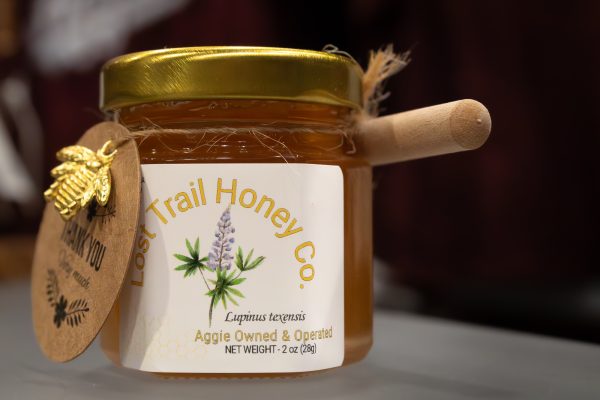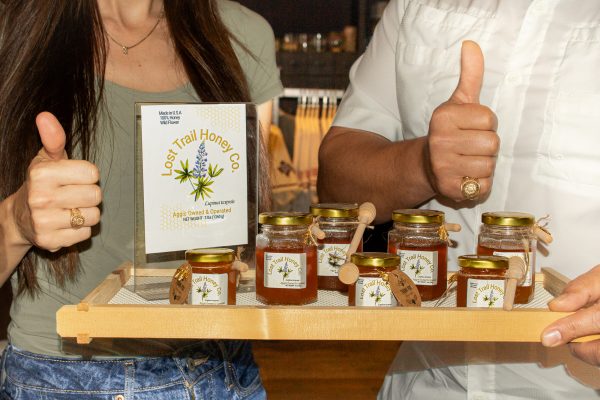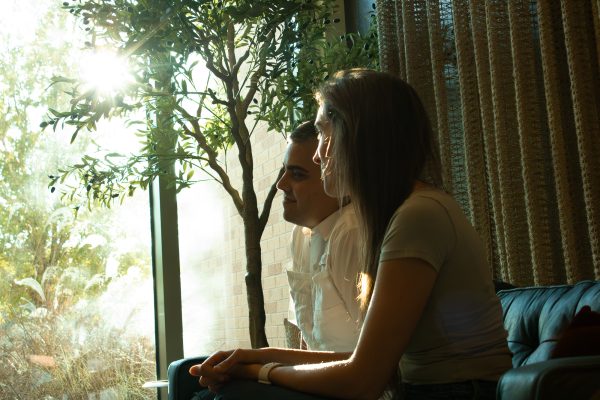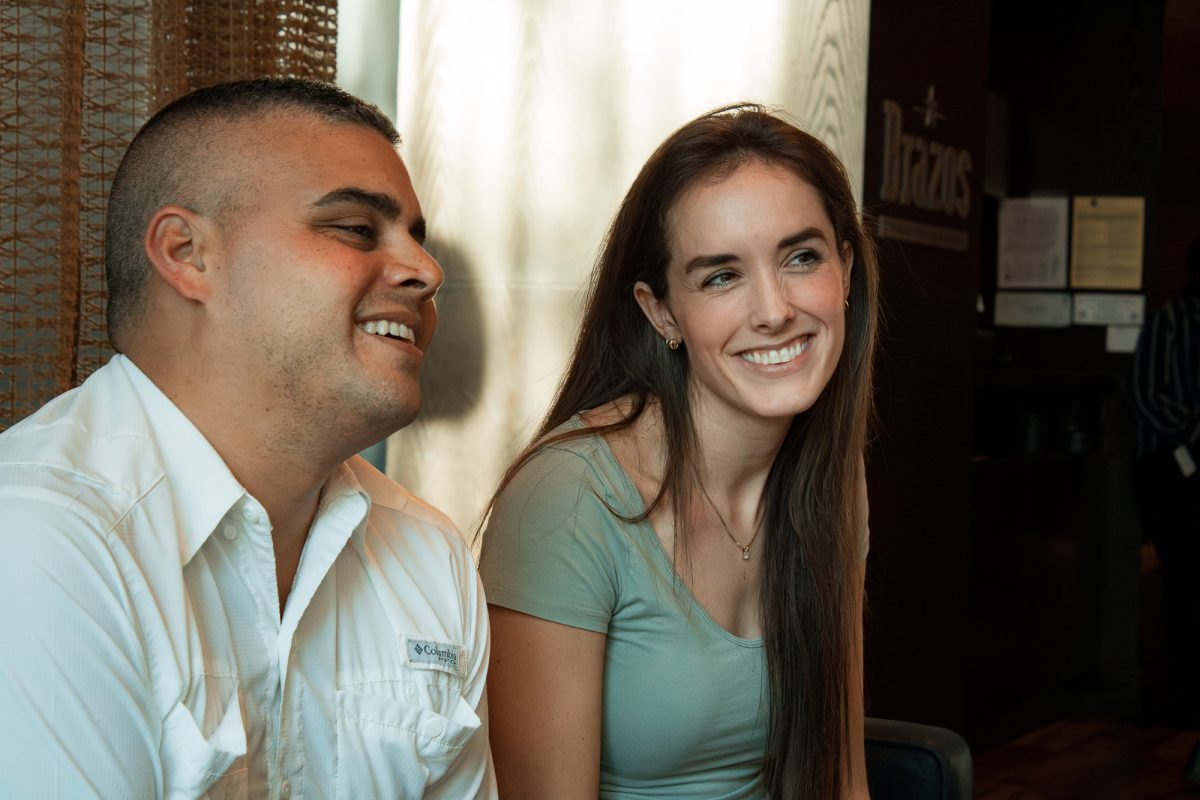Nestled in the crowded gift shop at the Texas A&M Hotel and Conference Center is a quaint display of honey jars labeled “Lost Trail Honey Co.” It may look unsuspecting, but each jar holds natural wildflower-sourced honey and an incredible backstory.
Near the Brazos River, a small homestead-turned-farm and apiary is managed by Abbey Kunkle ‘11 and Greg Kunkle ‘09, with the mission to provide high-quality organic produce and educate others about the benefits of growing food. The couple started Lost Trail Harvest Co. when they had an overabundance of produce from their personal garden, and the duo hasn’t slowed down since.
“We started mostly for our own food production,” Greg said. “Then the garden got so big that I couldn’t handle it by myself … so we had some student workers that come out and helped us. If we weren’t harvesting food every day, it would go bad because there was so much.”
From there, Abbey took a personal interest in beekeeping, and Greg noticed the abundance of wildflowers and water at their disposal.
“The area that we live on has five acres of wildflowers,” Greg said. “There’s no fertilizer, no pesticide, and completely all-natural, so we thought we could utilize all the bluebonnets that were starting to come out. … Now my wife and daughter put on the suits and go out there to tend to the bees, and we’re on track to have 30 hives.”
Thanks to Abbey’s beekeeping journey, her attitude toward the pollinators has drastically changed.
“It has been an adventure,” Abbey said. “Having the resources here to learn has been really cool. When I would see bees, I’d be a little scared and think, ‘Get that away from me.’ But now I think, ‘Oh, little friends.’ I really enjoy it. You have to be safe and know what you’re doing, but it’s very rewarding.”

With so much honey production, the Kunkles found themselves at a loss of what to do with it. They decided to reach out to the Texas A&M Hotel and Conference Center, which now uses their honey in their kitchen and offers it in the gift shop.
“We spoke to the people here at the Texas A&M Hotel, and they love promoting Aggie products,” Greg said. “ … We talked to them and they liked the story, especially because the honey was made down at the Brazos River.”
Greg’s Aggie education allowed him to learn and subsequently inform others about the benefits of growing produce. Just after graduation, he began working for the A&M Agri-Life extension in south Texas.
“I was a part of a community project of gardens from the USDA,” Greg said. “It was actually funded by Dr. Jenna Anding here at College Station. My first job after graduating, I learned how to garden, and honestly it changed my life.”
Greg says he believes that growing produce is a particularly beneficial skill to introduce to kids.
“The whole concept was to try to provide a healthy alternative for people to grow their own food,” Greg said. “Everyone’s going to make a mistake, but the best thing about plants is that they will grow back. You can plant another seed. … Growing your own food is kind of a lost science, and watching children see where their food comes from is such an important thing in my opinion. They will pluck a carrot from the ground or ask where a tomato comes from, and it’s this amazing surprise.”
He encourages parents to get involved and foster gardening memories with their children in order to teach them important lessons in health and adversity.
“I think most people don’t even plant gardens at home with their kids because it’s hard,” Greg said. “There’s failure involved — you plant a seed, it doesn’t grow or dies, or you forgot to water it one day in 100-degree heat and you lose it.”
The couple walked through what an average day is like while running Lost Trail Harvest Co., with Greg diving into the produce side of things.
“It’s very seasonal, so come springtime we will be nonstop planting” Greg said. “A full day typically involves planting in the morning time, and we germinate about 75 seeds in one tray, so about 200 plants at any given day.”

On the beekeeping side of things, Abbey explained the process of caring for the bees noting that, unlike gardening, the bees do a lot of the work themselves. All the pollinators need is a careful managing hand that knows not to take more honey than necessary.
“My job is to make sure they’re healthy and have what they need.” Abbey said. “Even in harvesting, you need to leave some [honey] for them, especially as they go through winter because you could lose all your hives if you’re not doing it correctly. … There’s always a problem to solve or a challenge, so you learn as you go.”
Despite being a small business, the Kunkles never feel threatened or pushed out by mainstream grocery chains, magnifying that drawing customers comes with having a quality product. Although it can be difficult starting out, he encourages small business owners to be persistent and let their product speak for itself.
“I think you can resonate with a customer base,” Greg said. “You may not be as successful as Walmart or H-E-B, but you will find customers if you foster relationships. Starting a small business is very relationship-based, it’s not transactional like those stores are.”
With College Station being such an agriculture-centric area, the business has thrived. That has also allowed Abbey and Greg to foster connections within the local community.
“Here at the Texas A&M hotel, they have partnered with local producers for food,” Greg said. “It’s fantastic that a place like the Texas A&M Hotel would buy local honey from a small family homestead like ours.”
The Kunkles expressed gratitude toward the Brazos Valley farming scene, highlighting the diverse local businesses and how they’ve made the couple feel welcome while learning to grow their business.
“We’ve seen growth in the Brazos Valley with the community farming network, especially at the farmers markets,” Greg said. “It’s fantastic seeing local families who specialize in different types of organic produce, and feel the same way we do about our honey and produce. They’re making sure it’s quality over quantity, they are using the best practices, and most importantly, they are sharing that blessing with other people.”











